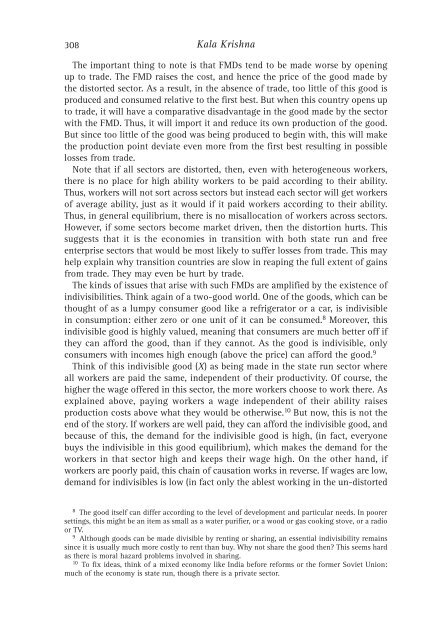Trade Adjustment Costs in Developing Countries: - World Bank ...
Trade Adjustment Costs in Developing Countries: - World Bank ...
Trade Adjustment Costs in Developing Countries: - World Bank ...
- No tags were found...
You also want an ePaper? Increase the reach of your titles
YUMPU automatically turns print PDFs into web optimized ePapers that Google loves.
308Kala KrishnaThe important th<strong>in</strong>g to note is that FMDs tend to be made worse by open<strong>in</strong>gup to trade. The FMD raises the cost, and hence the price of the good made bythe distorted sector. As a result, <strong>in</strong> the absence of trade, too little of this good isproduced and consumed relative to the first best. But when this country opens upto trade, it will have a comparative disadvantage <strong>in</strong> the good made by the sectorwith the FMD. Thus, it will import it and reduce its own production of the good.But s<strong>in</strong>ce too little of the good was be<strong>in</strong>g produced to beg<strong>in</strong> with, this will makethe production po<strong>in</strong>t deviate even more from the first best result<strong>in</strong>g <strong>in</strong> possiblelosses from trade.Note that if all sectors are distorted, then, even with heterogeneous workers,there is no place for high ability workers to be paid accord<strong>in</strong>g to their ability.Thus, workers will not sort across sectors but <strong>in</strong>stead each sector will get workersof average ability, just as it would if it paid workers accord<strong>in</strong>g to their ability.Thus, <strong>in</strong> general equilibrium, there is no misallocation of workers across sectors.However, if some sectors become market driven, then the distortion hurts. Thissuggests that it is the economies <strong>in</strong> transition with both state run and freeenterprise sectors that would be most likely to suffer losses from trade. This mayhelp expla<strong>in</strong> why transition countries are slow <strong>in</strong> reap<strong>in</strong>g the full extent of ga<strong>in</strong>sfrom trade. They may even be hurt by trade.The k<strong>in</strong>ds of issues that arise with such FMDs are amplified by the existence of<strong>in</strong>divisibilities. Th<strong>in</strong>k aga<strong>in</strong> of a two-good world. One of the goods, which can bethought of as a lumpy consumer good like a refrigerator or a car, is <strong>in</strong>divisible<strong>in</strong> consumption: either zero or one unit of it can be consumed. 8 Moreover, this<strong>in</strong>divisible good is highly valued, mean<strong>in</strong>g that consumers are much better off ifthey can afford the good, than if they cannot. As the good is <strong>in</strong>divisible, onlyconsumers with <strong>in</strong>comes high enough (above the price) can afford the good. 9Th<strong>in</strong>k of this <strong>in</strong>divisible good (X) as be<strong>in</strong>g made <strong>in</strong> the state run sector whereall workers are paid the same, <strong>in</strong>dependent of their productivity. Of course, thehigher the wage offered <strong>in</strong> this sector, the more workers choose to work there. Asexpla<strong>in</strong>ed above, pay<strong>in</strong>g workers a wage <strong>in</strong>dependent of their ability raisesproduction costs above what they would be otherwise. 10 But now, this is not theend of the story. If workers are well paid, they can afford the <strong>in</strong>divisible good, andbecause of this, the demand for the <strong>in</strong>divisible good is high, (<strong>in</strong> fact, everyonebuys the <strong>in</strong>divisible <strong>in</strong> this good equilibrium), which makes the demand for theworkers <strong>in</strong> that sector high and keeps their wage high. On the other hand, ifworkers are poorly paid, this cha<strong>in</strong> of causation works <strong>in</strong> reverse. If wages are low,demand for <strong>in</strong>divisibles is low (<strong>in</strong> fact only the ablest work<strong>in</strong>g <strong>in</strong> the un-distorted8 The good itself can differ accord<strong>in</strong>g to the level of development and particular needs. In poorersett<strong>in</strong>gs, this might be an item as small as a water purifier, or a wood or gas cook<strong>in</strong>g stove, or a radioor TV.9 Although goods can be made divisible by rent<strong>in</strong>g or shar<strong>in</strong>g, an essential <strong>in</strong>divisibility rema<strong>in</strong>ss<strong>in</strong>ce it is usually much more costly to rent than buy. Why not share the good then? This seems hardas there is moral hazard problems <strong>in</strong>volved <strong>in</strong> shar<strong>in</strong>g.10 To fix ideas, th<strong>in</strong>k of a mixed economy like India before reforms or the former Soviet Union:much of the economy is state run, though there is a private sector.














